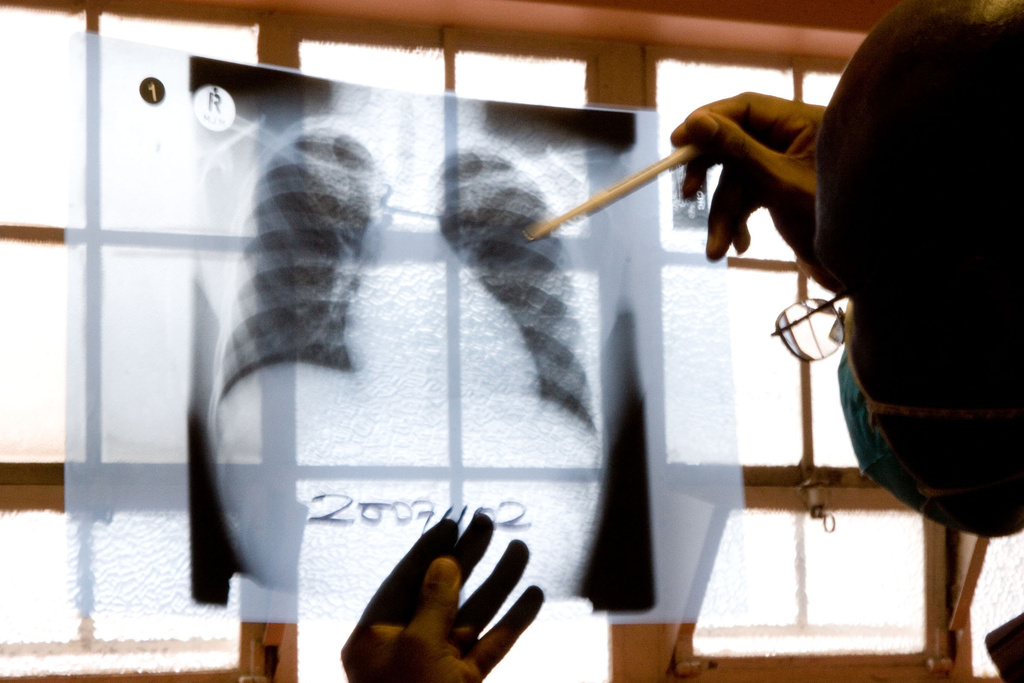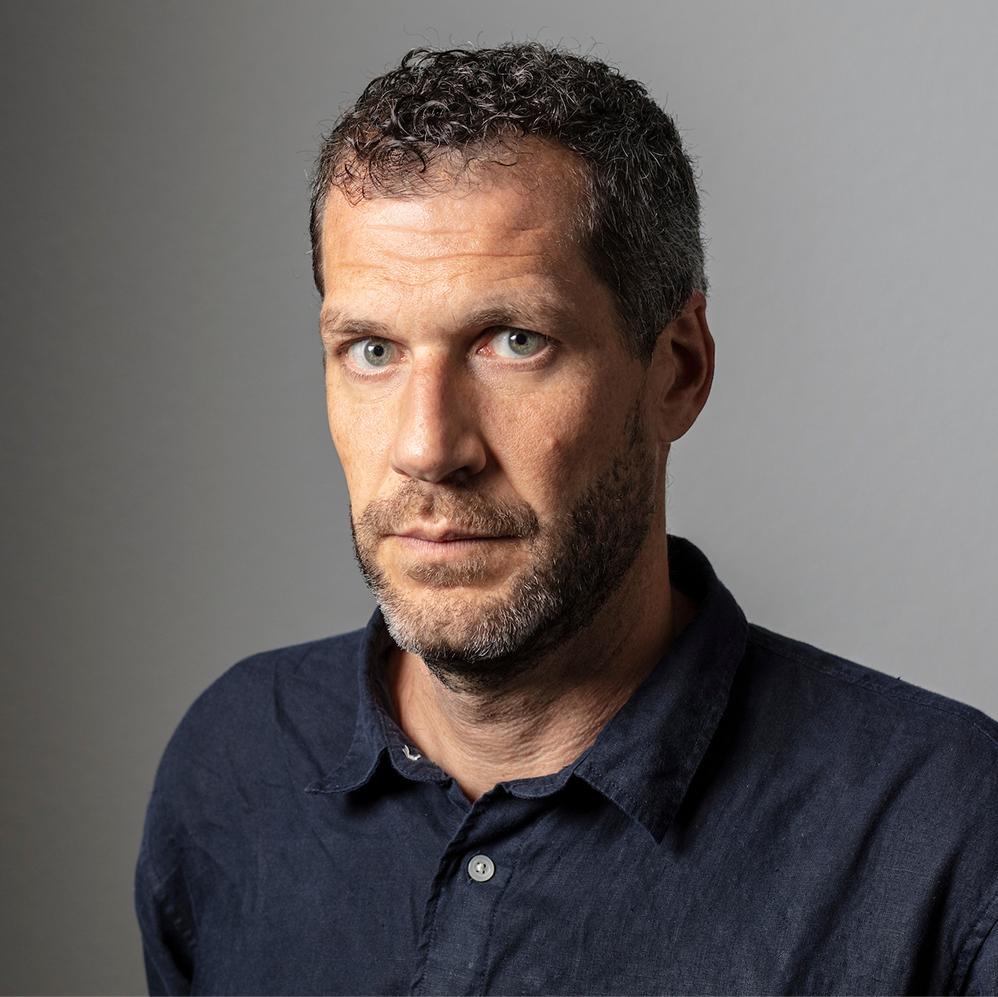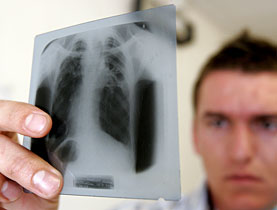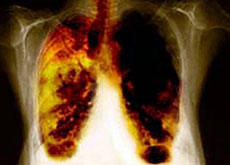“It will take centuries to eradicate TB”

Despite significant progress in recent years, tuberculosis (TB) remains one of the most deadly diseases in the world.
Dr Mario Raviglione heads the global fight against TB at the World Health Organization (WHO). In an interview with swissinfo.ch he warns that the progress made is fragile.
Tuberculosis claimed 1.4 million lives in 2010, 300,000 fewer than the year before, according to a recent WHO report. And for the first time the number of new infections also fell.
But Raviglione, who has headed the Stop TB Department at the WHO for ten years, warns that further progress is threatened by co-infection with HIV, the development of antibiotic resistant strains and the risk that governments will end their funding.
Often referred to as a “disease affecting the poor” or a “19th-century illness”, tuberculosis cannot yet be written off as a threat, he says.
swissinfo.ch: For the first time the WHO has announced that the number of tubercular infections across the world is in decline. Can we talk of success?
Mario Raviglione: For 15 years the number of tuberculosis deaths has been in constant decline. The number of cases is also going down, but that is a much more recent phenomenon. In practically all countries the strategy implemented by the WHO is a success.
Nevertheless, we are far from total success as the achievements of recent years are very fragile. The risk of a lack of political or financial engagement is a source of concern. Because of the global economic crisis and changed priorities, the big donors and some affected countries could be tempted to stop investing. In this case all the advances made in recent years would be lost.
swissinfo.ch: In what regions has progress been most noticeable?
M.R.: The greatest success has been registered in China, the country second-most affected by the disease [India has more cases]. In 2010, the number of cases there fell 40 per cent, while deaths were down 80 per cent in relation to 1990. In Africa, despite co-epidemic HIV/Aids, we have also witnessed a drop in recent years. Latin America is recording a drop of about three per cent a year. Put all these elements together and the number of cases worldwide is down about one per cent.
swissinfo.ch: Will we ever succeed in eradicating tuberculosis?
M.R.: With a drop of one per cent a year, it will take centuries before we can talk about the disease being wiped out. In Europe we thought for a long time that tuberculosis had died out. But it is still very present, particularly in western Europe among certain population groups: the poorest, immigrants and people affected by HIV/Aids. Tuberculosis is closely linked to HIV as it strikes people with immune deficiency.
Until now no country has succeeded in eradicating tuberculosis. To do that in developed countries we need to focus more on the at-risk groups, something no government is doing in a convincing way. In developing countries the obstacles are not just financial but also to do with organisation. Health systems do not always have the capacity to do screening and ensure patients receive the right treatment.
swissinfo.ch: Is TB being taken seriously by the international community?
M.R.: Tuberculosis is without doubt the most neglected disease in the world. It is certainly more neglected than Aids, which is on the political agenda of almost all countries. Yet TB still kills 1.4 million people every year, almost as many HIV/Aids, which claims almost two million victims, including 300,000 who also have tuberculosis. It kills exactly the same number as malaria does.
Currently the WHO mainly survives on donations from the United States. No European country supports the fight against TB to a meaningful extent. My other big concern is the growing resistance tuberculosis is showing to the two most-used antibiotics, Isoniazid and Rifampicin.
swissinfo.ch: How widespread is the problem?
M.R.: Multi-resistant TB is present everywhere in the world. In the former Soviet Union one sufferer in three has a resistant form of the disease. If the diagnosis is not made at the outset and the patients are treated normally, the risk of failure is more than 50 per cent. The coincidence of multi-resistant TB and HIV is fatal in more than 90 per cent of cases.
swissinfo.ch.: Why is TB becoming more and more resistant to antibiotics?
M.R.: As with other disease, wrong use of antibiotics is to blame. When a patient is badly cared for, the bacillus becomes resistant to one or more antibiotics. The person coming in contact with that bacillus will immediately develop a multi-resistant form of tuberculosis.
The cost of medication to treat a normal tuberculosis is around SFr25 ($29) for six months. That figure rises to several thousand francs for treating multi-resistant TB. Add to that the length of treatment, which can run to two years, and high hospital costs, and you get an idea of the problems this creates in developing countries.
Following a peak of nine million in 2005, the number of people contracting TB fell to 8.8 million in 2010, according to the WHO.
Close to 1.4 million people died of the disease last year.
The mortality rate fell by 40% between 1990 and 2010 and should fall by 50% by 2015, except in Africa, in line with UN Millennium Development Goals.
Across the world, two billion people carry the Koch bacillus, responsible for TB. But 90% of those infected never develop the disease.
The disease is spread by aerosols, that is in the form of droplets spread by coughing, sneezing and talking.
Around 500 people in Switzerland contract TB every year, usually a form which is easily treated. Most of these cases are among immigrants, according to the Federal Health Office.
Pharmacoresistant tuberculosis results from irregular or partial treatment, where patients do not regularly take their medication for the period prescribed.
Multi-resistant tuberculosis is a particularly dangerous form of resistant TB, with the bacilli resisting the two most effective antibiotics.
There are an estimated 440,000 cases of multi-resistant TB in the world, including 81,000 in Europe. Russia, Ukraine and Azerbaijan are the European countries most affected.
(Translated from French by Morven McLean)

In compliance with the JTI standards
More: SWI swissinfo.ch certified by the Journalism Trust Initiative





You can find an overview of ongoing debates with our journalists here. Please join us!
If you want to start a conversation about a topic raised in this article or want to report factual errors, email us at english@swissinfo.ch.